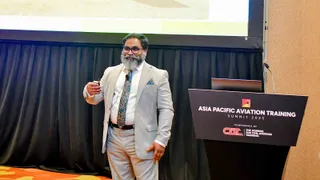EATS 2025 Explores AI, Competency and Aviation's Future
Contact Our Team
For more information about how Halldale can add value to your marketing and promotional campaigns or to discuss event exhibitor and sponsorship opportunities, contact our team to find out more
The Americas -
holly.foster@halldale.com
Rest of World -
jeremy@halldale.com

Couldn't make it to Cascais? The European Aviation Training Summit (EATS) wrapped up last week with powerful discussions on AI integration, competency-based training, and the future of aviation safety. Here's your essential recap of presentations from day 1.
Instructor Concordance Takes Center Stage
Frank Steiner of conavitra GmbH challenged the aviation training community to expand their view of instructor concordance beyond Evidence-Based Training frameworks. Drawing on data from nearly 3,000 instructors, Steiner demonstrated how reliable and valid assessments impact not only safety and credibility but also deliver significant economic benefits by reducing unnecessary retraining.
Cabin Crew Selection and Preparation Under the Microscope
The cabin crew sessions revealed critical gaps in industry standardization. Caroline Creane from Symbiotics presented survey findings showing that while pilot selection is increasingly regulated, no widely adopted standards exist for cabin crew despite their critical safety role. Emily Hooker of Skypeople Training proposed a solution: completing Cabin Crew Attestation before airline training begins. Survey data from 66 aviation professionals showed that over one-third cite motivation and readiness as ongoing challenges, yet only 50% of airlines assess foundation knowledge pre-training.
Richard Kubelka from Czech Aviation Training Centre emphasized the importance of balancing theoretical knowledge with practical skills in initial training, sharing insights from examining nearly 150 trainees over the past year.
Maintenance Training Embraces Competency-Based Approaches
The maintenance sessions explored how CBTA is transforming technician training. Mike Miller from Boeing Global Services highlighted that performance assessment represents the most significant pivot from traditional training methods, requiring a fundamental shift in instructor roles. Florian Bausch of Lufthansa Technical Training took delegates on a philosophical journey, emphasizing that "competence is more than knowledge—it's about judgment, teamwork, and responsibility."
Artificial Intelligence Emerges as Training's Co-Pilot
AI dominated afternoon discussions with three powerful presentations. Cedric Paillard of The Airline Pilot Club revealed how Amelia's AI toolkit reduced time-to-first-solo by 15% and increased underrepresented minority retention by 11% through personalized learning pathways. Shane Jordan from Hilo Aviation delivered a sobering message: "The next accident is already hidden in your data." His presentation outlined a three-phase process—Structure, Analyze, Discover—for leveraging AI to prevent accidents by uncovering patterns linking training effectiveness to safety outcomes.
The AI workshop debrief synthesized a clear industry consensus: AI must act as a co-pilot, not an autopilot, with human-in-the-loop governance remaining paramount.
Technology Solutions Address Real-World Challenges
A collaborative effort between EasyJet, Jet2, and British Airways representatives presented their forthcoming white paper on aligning technology innovation with operational realities. The team's white paper aims to bridge the gap between innovative ideas showcased at conferences and the practical challenges airlines face daily.
Neil Waterman and Jeremy Goodman from ASTi traced the regulatory journey of Simulated ATC Environment technology, now being adopted by airlines to address runway incursion training and expanding into routine LOFT and LOS training. As one U.S. airline training director stated: "We simply cannot sit around waiting for regulators to react to an accident."
Thomas Bessiere of HINFACT concluded the technology sessions by proposing a paradigm shift: integrating CBTA within a unified ecosystem connecting Training Management Systems and Safety Management Systems, transforming training from a compliance burden into a proactive safety tool.
The insights and innovations shared at EATS 2025 signal a pivotal moment for aviation training—one where technology amplifies human expertise, data drives smarter decisions, and competency-based approaches redefine what it means to prepare the next generation of aviation professionals.


